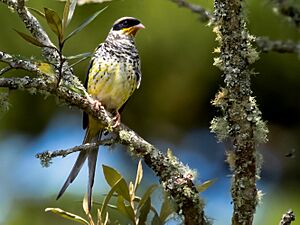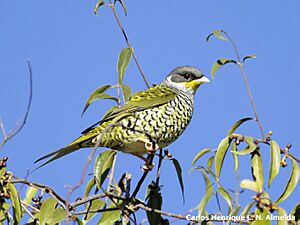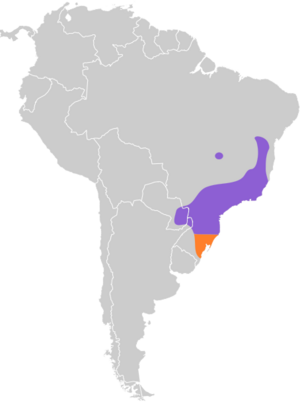Swallow-tailed cotinga facts for kids
Quick facts for kids Swallow-tailed cotinga |
|
|---|---|
 |
|
 |
|
| Male above, female below (both in southeastern Brazil) | |
| Conservation status | |
| Scientific classification |
|
| Kingdom: | Animalia |
| Phylum: | Chordata |
| Class: | Aves |
| Order: | Passeriformes |
| Family: | Cotingidae |
| Genus: | Phibalura Vieillot, 1816 |
| Species: |
P. flavirostris
|
| Binomial name | |
| Phibalura flavirostris Vieillot, 1816
|
|
 |
|
| Script error: The function "autoWithCaption" does not exist. | |
Script error: No such module "Check for conflicting parameters".
The swallow-tailed cotinga (Phibalura flavirostris) is a beautiful bird known for its unique tail. It belongs to a group of birds called passerines, which are often called "perching birds." This means they have feet designed to grip branches. The swallow-tailed cotinga is part of the Cotingidae family and is the only species in its group, called a genus, named Phibalura.
Contents
Where the Swallow-tailed Cotinga Lives
This special bird lives in South America. There are two main groups, or subspecies, of the swallow-tailed cotinga.
The Brazilian and Nearby Group
One group, known as P. f. flavirostris, lives in the Atlantic forest. This forest is found in southeastern Brazil, eastern Paraguay, and a small part of Argentina called Misiones. These birds love the trees and plants of this forest.
The Bolivian Group
The other group, P. f. boliviana, is found only in a specific area near Apolo in Bolivia. This group was thought to be gone for a long time! Scientists didn't see any for 98 years until they rediscovered them in 2000.
Protecting Their Homes
Both groups of swallow-tailed cotingas face a big problem: habitat loss. This means their forest homes are being destroyed or cut down. Because of this, it's very important to protect the forests where they live.
Different Kinds of Cotingas
Sometimes, scientists disagree about whether two groups of animals are separate species or just different types of the same species. This is the case with the swallow-tailed cotinga.
The Apolo Cotinga Debate
The Bolivian group (P. f. boliviana) is sometimes called the "Apolo cotinga" or "palkachupa cotinga." Some bird experts, like those at BirdLife International, think this Bolivian group is a completely separate species.
What Other Scientists Say
However, other groups, like the South American Classification Committee, decided in 2011 that it's still the same species. A big study in 2014 looked at the DNA of these birds. The study found only small differences between the DNA of the two groups. This means there wasn't enough strong evidence to say they are totally different species. So, for now, most scientists consider them to be two types of the same swallow-tailed cotinga.
 | Kyle Baker |
 | Joseph Yoakum |
 | Laura Wheeler Waring |
 | Henry Ossawa Tanner |


